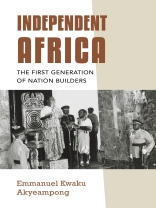Independent Africa explores Africa’s political economy in the first two full decades of independence through the joint projects of nation-building, economic development, and international relations.
Drawing on the political careers of four heads of states: Kwame Nkrumah of Ghana, Ahmed Sékou Touré of Guinea, Léopold Sédar Senghor, and Julius Kambarage Nyerere of Tanzania, Independent Africa engages four major themes: what does it mean to construct an African nation-state and what should an African nation-state look like; how does one grow a tropical economy emerging from European colonialism; how to explore an indigenous model of economic development, a ‘third way, ‘ in the context of a Cold War that had divided the world into two camps; and how to leverage internal resources and external opportunities to diversify agricultural economies and industrialize.
Combining aspects of history, economics, and political science, Independent Africa examines the important connections between the first generation of African leaders, and the shared ideas that informed their endeavors at nation-building and worldmaking.
表中的内容
Acknowledgments
Acronyms and Abbreviations
Introduction
1. Africa in the Twentieth Century
2. Religion, Culture, and the Arts in the Making of the Africa Nation State
3. Economic Imaginaries: African Leaders and Development Economics
4. Pan-African Socialism: The African Developmental State, Regional Integration, and Worldmaking
5. Nkrumah, Cocoa, and the United States: The Vision of an Industrialized African Nation-State
Conclusion
Notes
Bibliography
Index
关于作者
Emmanuel Kwaku Akyeampong is Ellen Gurney Professor of History and of African and African American Studies at Harvard University. He also serves as the Oppenheimer Faculty Director of the Center for African Studies. He is the author of Drink, Power, and Cultural Change: A Social History of Alcohol in Ghana c. 1800 to Recent Times, and Between the Sea and the Lagoon: An Eco-social History of the Anlo of Southeast Ghana ca. 1850 to Recent Times.












